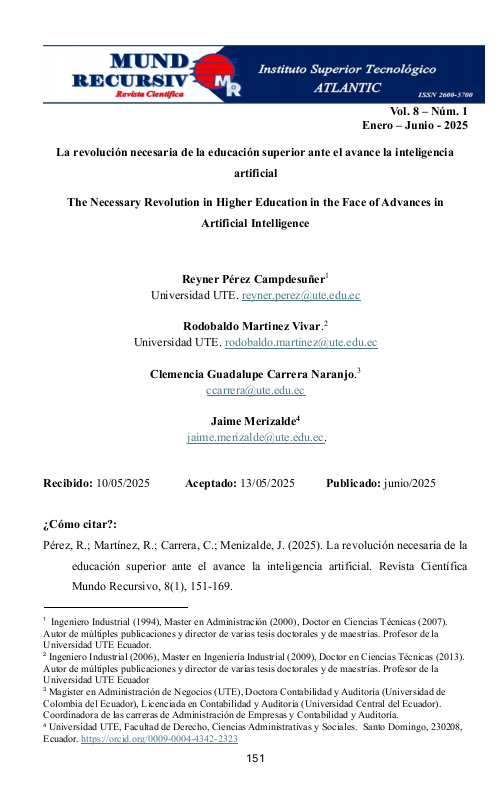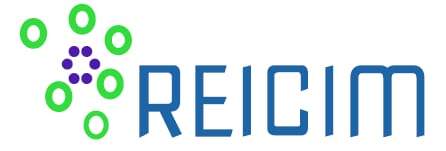The Necessary Revolution in Higher Education in the Face of Advances in Artificial Intelligence
Keywords:
Higher education, Artificial intelligence, Change managementAbstract
Higher education dates back several centuries and has been forced to evolve over the years in response to technological and social changes. In recent decades, as the pace of technological change has increased, the need for a change in higher education has also increased. With the emergence of artificial intelligence, the need to transform the entire higher education system has become even more evident. Teaching methods oriented toward the development of memory, theoretical analysis, and computational skills must be replaced with skills that foster questioning, critical thinking, and creativity. This new demand requires changing not only with the curriculum design but also the competencies of the teaching staff and the assessment system used to verify the achievement of results. This research presents the results of an exploratory study conducted to assess the progress made in implementing these changes at higher education institutions in the province of Santo Domingo, Ecuador. It shows that, while progress has been made in some areas, these are still insufficient to meet the demands of the environment.
References
Afriliana, N., Meyliana, M., Gaol, F. L., & Soeparno, H. (2025). INTELLIGENT DECISION SUPPORT SYSTEM FOR COMPLIANCE MONITORING OF STUDY PROGRAMS IN HIGHER EDUCATION IN INDONESIA. Journal of Engineering Science and Technology, 20(2), 1-7. Scopus.
Aydemir, M. (2025). Multiplicities and fluidity in the networked relationships of migrant academics in Britain. International Migration, 63(2). Scopus. https://doi.org/10.1111/imig.13316
Carroll, N., Lang, M., & Connolly, C. (2025). An extended community of inquiry framework supporting students in online and digital education. Innovations in Education and Teaching International, 62(2), 369-385. Scopus. https://doi.org/10.1080/14703297.2024.2326658
Chen, B., Zheng, W., Zhao, L., & Ding, X. (2025). Leveraging large language models to assist philosophical counseling: Prospective techniques, value, and challenges. Humanities and Social Sciences Communications, 12(1). Scopus. https://doi.org/10.1057/s41599-025-04657-7
Gutiérrez, M. del C., García-Valcárcel, A., & Basilotta-Gómez-Pablos, V. (2023). *La inteligencia artificial en la educación superior: desafíos para la formación y el aprendizaje*. Perfiles Educativos, 45(179), 121–142. https://doi.org/10.22201/iisue.24486167e.2023.179.81984
Helker, K., Bruns, M., Reymen, I. M. M. J., & Vermunt, J. D. (2025). A framework for capturing student learning in challenge-based learning. Active Learning in Higher Education, 26(1), 213-229. Scopus. https://doi.org/10.1177/14697874241230459
Ldokova, G., Frumina, S., & Alwaely, S. A. (2025). Taking into account students’ psychotypes and using their neuropsychological maps when implementing digital educational technologies within the Metaverse. Smart Learning Environments, 12(1). Scopus. https://doi.org/10.1186/s40561-024-00344-3
Lionar, U., Mulyana, A., Sapriya, S., Winarti, M., Mairi, S., & Engkizar, E. (2025). Exploring Research Trends in Global Citizenship Education: A Bibliometric Study Utilizing the Scopus Database. European Journal of Educational Research, 14(2), 567-584. Scopus. https://doi.org/10.12973/eu-jer.14.2.567
Malagón Castro, L. E., Valencia González, G. C., Vázquez Parra, J. C., & Ríos Sánchez, A. (2025). Critical Interculturality in Latin American Education: Challenges and Advances. International Journal of Learner Diversity and Identities, 32(1), 121-143. Scopus. https://doi.org/10.18848/2327-0128/CGP/v32i01/121-143
Nylén-Eriksen, M., Stojiljkovic, M., Lillekroken, D., Lindeflaten, K., Hessevaagbakke, E., Flølo, T. N., Hovland, O. J., Solberg, A. M. S., Hansen, S., Bjørnnes, A. K., & Tørris, C. (2025). Game-thinking; utilizing serious games and gamification in nursing education – a systematic review and meta-analysis. BMC Medical Education, 25(1). Scopus. https://doi.org/10.1186/s12909-024-06531-7
Onódi, Z., Riba, P., Ferdinandy, P., Görbe, A., & Varga, Z. V. (2025). Implementing the flipped classroom model to enhance knowledge retention in pharmacology: A local case study at Semmelweis university. BMC Medical Education, 25(1). Scopus. https://doi.org/10.1186/s12909-025-06913-5
Paliktzoglou, V., & Vlachopoulou, O. (2025). Exploring the Educational Transformations: A Systematic Literature Review on the Influence of the Internet of Things in Higher Education. EAI Endorsed Transactions on Internet of Things, 11. Scopus. https://doi.org/10.4108/eetiot.4999
Shang, Y., Cao, K.-F., Yue, J.-Y., Zhao, S.-Z., Hao, S.-H., Sun, Y.-Z., Cui, Q.-Y., Guo, H.-M., & Tang, C.-H. (2025). Comparative effectiveness of various teaching modes, including PBL, CBL, and CTTM in paediatric medical education with combined online and offline approaches. BMC Medical Education, 25(1). Scopus. https://doi.org/10.1186/s12909-024-06267-4
Singun, A. J. (2025). Unveiling the barriers to digital transformation in higher education institutions: A systematic literature review. Discover Education, 4(1). Scopus. https://doi.org/10.1007/s44217-025-00430-9
Tong, M., & Xiao, P. (2025). The Application of Digital Twin Technology Empowered by 5G Networksand Big Data in Smart Campus. 79-85. Scopus. https://doi.org/10.1145/3705754.3705769
Toti, G., Si, L., Daniels, D., Amoozadeh, M., Alipour, M. A., & Chen, G. (2025). Students and instructors reflections on the impact of COVID-19 on computer science education after 1 year of remote teaching. Discover Education, 4(1). Scopus. https://doi.org/10.1007/s44217-025-00438-1
Venegas-Mejía, V. L., Esquivel-Grados, J., Benavidez-Núñez, F. R., & Quispe-Ticona, I. L. (2025). Education for Sustainability: A Valuative Perspective on Learning and Knowledge Technologies by Graduates. Clio. Revista de Historia, Ciencias Humanas y Pensamiento Critico., 5(9), 267-288. Scopus. https://doi.org/10.5281/zenodo.14559327
Wang, Z., Chai, C.-S., Li, J., & Lee, V. W. Y. (2025). Assessment of AI ethical reflection: The development and validation of the AI ethical reflection scale (AIERS) for university students. International Journal of Educational Technology in Higher Education, 22(1). Scopus. https://doi.org/10.1186/s41239-025-00519-z
Yaqin, L. N., Bilad, M. R., Yusof, B., Hassan, H., Damit, A. R., & Chuchu, I. F. (2025). Mapping research evolution in higher education: A scientometric analysis of Brunei Darussalam (1986–2024). Discover Sustainability, 6(1). Scopus. https://doi.org/10.1007/s43621-025-00917-3
Zapata, G. C., Saini, A. K., Tzirides, A. O., Cope, B., & Kalantzis, M. (2025). The Role of AI Feedback in University Students’ Learning Experiences: An Exploration Grounded in Activity Theory. Ubiquitous Learning, 18(2), 1-30. Scopus. https://doi.org/10.18848/1835-9795/CGP/v18i02/1-30

Published
Issue
Section
License
Copyright (c) 2025 MUNDO RECURSIVO

This work is licensed under a Creative Commons Attribution-NonCommercial 4.0 International License.









